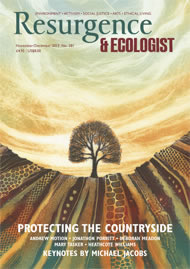Richard Ryder has forged a new James Bond – an eco-Bond – from his environmentally literate hero, Charles Tempest.
Tempest is a righter of human rights abuses and of ecocidal wrongs; a new prototype who seems to have been waiting in the wings before picking the right moment to launch himself into the landscape of adventure fiction and thus cause maximum impact.
With increased public awareness of the reckless callousness of the commercial food chain and of the impervious cruelty of the US Empire, and the indifference of the consumer society to human rights and to imminent climate change, the appearance of Ryder’s hero couldn’t be more timely; and Tempest, The Black Pimpernel, has certainly come custom-made for a movie.
Tempest is the creation of a noted pioneer of animal rights: it was Ryder, of course, who coined the word ‘speciesism’ – a verbal usage that’s passed painlessly into the language – and Tempest couldn’t have chosen more suitable parentage.
The novel begins with a daring rescue from Death Row in Texas, where a woman about to be given a lethal injection looks up to see an Abrams M1A2 tank bursting through the execution chamber’s wall, followed by two troop carriers, which have flattened the perimeter fence.
It’s her rescuers, and she is deftly whisked away by The Black Pimpernel under the noses of a red-necked governor and the gloating fans of the death penalty gathered outside the penitentiary. The defeat of the US justice system, with its laughable ‘justice’, and its hundreds tortured on death rows in state after state, is to be read with relish; and after this introduction to Tempest, swashbuckling in the noblest of causes, the reader is soon securely on board as the novel gathers pace.
Three thrilling rescues follow, each worthy of an episode of TV’s Spooks or Homeland. Hostages are rescued from kidnappers; a clinic practising female circumcision on an industrial scale and run by the corporate epitome of cynical depravity is warned to clear all its staff, and then its proprietors are obliged to watch it being blown to pieces.
“We are fighting pain wherever it occurs,” Tempest proclaims. “We hate cruelty. We call upon the governments of the world to do more to stop it” – and he and former SAS colleague Tarka Bradley equip themselves appropriately with “state-of-the art nonlethal demobilising weaponry”.
Tempest champions justice for animals as well as for humans, and Ryder gives him a much wider brief than Sir Percy Blakeney, Baroness Orczy’s Scarlet Pimpernel (who confined himself to rescuing hapless aristos from the French Revolution’s guillotine). Tempest can be seen as seamlessly joining the pantheon of classic macho heroes (Tarzan, Superman, Batman and Bond). And in his everyday life, our hero doubles as a practising psychologist with a large private income (enough to buy any hotels whose managers have offended him).
Ryder’s protagonist is an unexpected invention: more Noël Coward than Swampy: happier in Knightsbridge than in Dalston, and happier having his hair cut in Trumpers than growing it into knotted, furry locks. But cast against the stereotype, Ryder’s hero can be that much more deadly, being able to move through the corridors of power without arousing suspicion.
An early paragraph indicates the germ of Tempest’s right-minded concerns: “Charles lay there alone with the animals, as he had so often done as a child, feeling utterly at ease with them. They were his friends.” He marches to a different drummer, and is motivated to change things through feats of derring-do rather than by lobbying his MP. His mindset and his gang of black-clad goggle-eyed missionaries lead to the UK prime minister’s declaring Black Pimpernels terrorists, to which Tempest simply retorts: “If prime ministers did more to deal with these cruelties we wouldn’t have to do it for them.”
Few can resist a ripping yarn, particularly if a hero, so evidently engaging, has his heart in the right place.
Tempest becomes a cult figure, and he is freed on one occasion in the midst of a London that’s festooned with ‘Free Tempest’ banners, but you’ll have to read the novel to find out why, and why Tempest’s time has come – a DIY philanthropist-activist with muscle and chutzpah, whose ‘true grit’ has an improving purpose.








